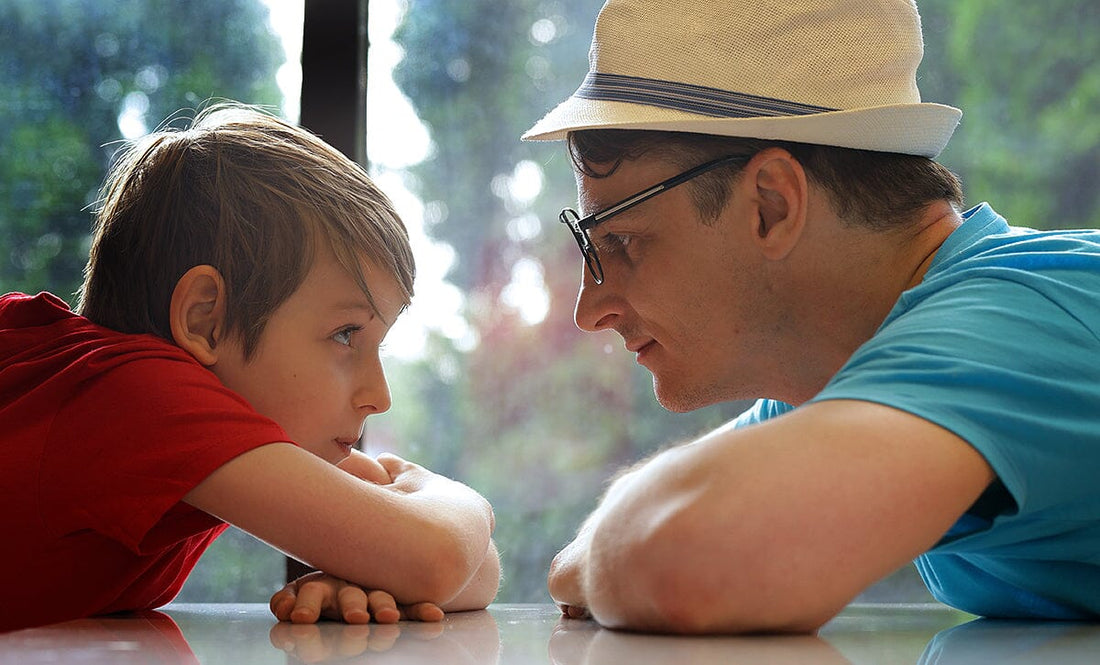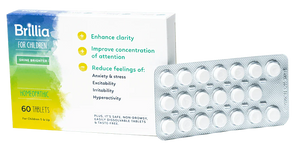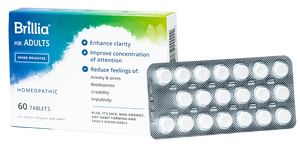Every April is Autism Awareness Month, in which individuals and organizations across the world band together to increase global understanding and acceptance of people with autism. Though the condition affects 1 in 36 children in the U.S. and 1 in 45 adults, there is a lot that is misunderstood about autism, including how to approach treatment.1, 2
Read on to find out ways to help your child with autism, how to cope as an adult, and how homeopathic medication like Brillia can help.
Understanding Autism Spectrum Disorder
Autism Spectrum Disorder, or ASD, refers to a broad range of neurodevelopmental conditions characterized by repetitive and characteristic patterns of behavior and difficulties with social interaction and/or speech.
Autism is called a spectrum disorder because each person with the condition has their own unique strengths and challenges. While one person may be non-verbal, another will have extensive communication skills, but struggle to pick up on social cues.
Symptoms typically appear in childhood and may be accompanied by sensory issues and medical conditions like gastrointestinal (GI) disorders, seizures, and sleep disorders. Research shows seven out of ten people with autism also have a mental health condition such as anxiety, depression, OCD, or ADHD.3
How to Help Your Child with Autism
There is no one-size-fits-all approach to addressing autism. Since every child experiences the condition differently, it’s important to tailor your support in a way that suits their individual needs. Before we explore medical treatments, we’ll break down how you can help your child at home:
- Educate yourself on autism: You cannot help your child if you are not armed with information. Educate yourself on the condition, from different treatments to classroom accommodations.
- Be consistent: Many children struggle with not knowing what to expect. Create a daily routine with regular meal times, homeworks time, and bedtime. If there’s going to be a disruption, let them know ahead of time so they can prepare.
- Know their triggers: You know your child best. To help avoid meltdowns, figure out what triggers them and what helps them feel calm. This may include sensory information like sounds, textures, or smells. This will help you be more effective at avoiding or modifying situations that bring unease.
- Reward to reinforce: Recognizing your child’s good behavior does wonders for their self-esteem. You may be quick to point out when they’ve crossed a boundary, but try your best to praise their positive actions too, so they can feel motivated to do more of what earns them praise.
- Promote a healthy lifestyle: Your child’s symptoms can be exacerbated by poor nutrition, lack of sleep, or even too much screen time. Make sure you’re enforcing a healthy diet at home, encouraging adequate sleep, controlling screen time, and ensuring they’re getting enough exercise. Mindfulness and relaxation techniques can also be helpful, including using certain products like fidget toys and weighted blankets.
- Get support: Whether that means seeking a therapist or support group, reaching out to others who have been on the same road as you can help you feel heard. They can also offer tips on ways they’ve helped their child socialize, eat better, sleep better, and more.
How to Cope with Autism as an Adult
Whether you were diagnosed as a child or didn’t get your diagnosis until adulthood, autism can be a bumpy road if you don’t know what to expect. If you’re a woman, it can be even harder. Women are four times less likely to be diagnosed with autism because they are thought to be better at masking their symptoms than men.4 While the suggestions above are intended to help parents better understand their children with autism, the suggestions below are aimed at helping you better understand yourself.
- Educate yourself: Learn all you can about autism. Read the books, visit the websites, talk to others with autism. There are so many resources out there to help you communicate more effectively, connect more readily, and thrive.
- Recognize your triggers: Think of a time you felt overwhelmed by your environment. Try to single out why you felt the way you did. Maybe you find group conversations disorienting or crowded malls too draining. Once you recognize your triggers you can more easily prepare yourself for these experiences or adjust them to your preferences.
- Stay active: Exercise is a great way to release pent up energy, ease stress and anxiety, and stay healthy. Be open to experimenting with different workouts until you find what works for you. It might be as intense as weight lifting or as gentle as going for a walk.
- Practice mindfulness: From mindfulness meditation to deep breathing exercises, mindfulness is an important practice for anyone, but especially for a person with autism. And the science backs this up. A 2020 study found that self-guided mindfulness and cognitive behavioral techniques may be useful in reducing levels of anxiety in people with autism.5
- Be open about your diagnosis: Hiding who you really are is exhausting and it can get in the way of your ability to authentically connect with others. But if you’re open about your diagnosis, it can feel like there’s a weight lifted off your shoulders.
Are Autism Symptom Treatments Different for Children vs Adults?
There is no standard treatment, whether you are a child or an adult. Treatment will depend on your specific symptoms, challenges, and needs. However, the treatments will be age-appropriate. So if both an adult and a child need social skills training, they may see a therapist or join a class to develop relevant strategies. While the child might focus on how to interact with their classmates, behave in the classroom, and handle teasing, an adult might focus on expressing themselves at work, how to appropriately use humor, and maybe dating etiquette.
Treatments that Help Reduce Autism Symptoms in Children
The most common treatments to help reduce autism symptoms in children include:
- Early intervention: This treatment takes place in preschool or before and may include speech therapy, physical therapy, and nutritional support. The idea is that the child’s brain is more impressionable at a young age and the chances of correcting unwanted behavior are higher.
- Behavioral management therapy: The goal of this type of therapy is to reinforce acceptable behaviors and reduce unacceptable or unwanted behaviors. This may also include training for parents to address their child’s behavior constructively.
- Cognitive behavioral therapy (CBT): During this type of talk therapy, a medical practitioner helps the child identify negative thoughts and behaviors and understand how thoughts affect actions. Together, they come up with strategies to challenge negative thoughts while developing new behaviors.
- Social skills training: This training helps kids learn skills to effectively interact with others. It entails repeating and reinforcing certain desired behaviors so that they become habits.
- Occupational therapy: This type of therapy helps people with autism complete everyday tasks, such as personal hygiene or dressing themselves, as well as cope with their sensory processing issues. An occupational therapist may also help with motor skills much like a physical therapist.
- Speech pathology: Speech pathologists work with verbal and non-verbal children to learn how to express themselves, improve rhythm of speech, develop signing strategies, or learn how to use symbols.
- Medication: There is no approved drug to cure autism or all of its symptoms. But some doctors may use prescription medication to deal with a specific symptom or comorbid condition, like anxiety or ADHD. This may include SSRIs, anti-anxiety medications, stimulant drugs, or tricyclics. But research shows medication is most effective when combined with behavioral therapies.6
Treatments that Help Reduce Autism Symptoms in Adults
Adults may benefit from many of the treatments listed above, including CBT, social skills training, speech pathology, occupational therapy, and medication. As we mentioned above, these treatments will simply be tailored to make them more relevant to adult life.
An adult with autism can also benefit from working with a vocational counselor if symptoms have interfered with working. A vocational counselor can help identify your specific strengths and skills and then assist you in finding or retaining employment.
How Brillia Can Help Autism Symptoms
Though many people with autism find great success with prescription medications, it’s important to know these medications are not a cure and they only help to manage symptoms. They are also associated with a range of side effects, such as upset stomach, drowsiness, dry mouth and others.
An alternative to prescription medication is Brillia, a homeopathic medication that uses targeted antibodies to help reduce symptoms like anxiety, impulsivity, restlessness, and irritability without causing any harmful side effects.
Many people with autism or parents of autistic children report that Brillia helps in the following specific ways:
- Mood regulation: Children on Brillia have fewer meltdowns and less aggressive reactions. Adults report that they have less anxiety.
- Anger management: Both children and adults feel more equipped to express their emotions and process them constructively.
- Comorbid conditions: Along with reducing anxiety, Brillia can also help reduce hyperactivity and improve attention and focus in users.
Brillia is available for children, teens and adults. There are also no contraindications with the medication, so if you are already taking prescription drugs for your symptoms, Brillia can be added to your regimen without worry to address lingering symptoms or secondary symptoms caused by your current medications.
Another unique factor is that Brillia is part of a holistic approach. The medication’s success is maximized by following a healthy lifestyle as outlined in the 5 Pillars: proper nutrition, adequate sleep, controlled screen time, and mindfulness.
Find out more about how Brillia works and explore more resources at the Brillia(nce) Resource Center.
Get a whole bunch of support right in your inbox.







